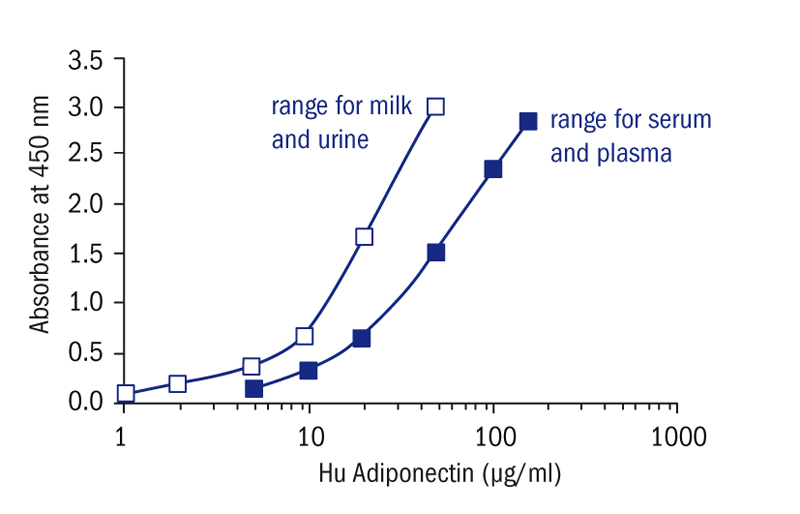Type
Sandwich ELISA, HRP-labelled antibody
Applications
Serum, Urine, Cerebrospinal fluid, Milk, Plasma
Sample Requirements
10 µl/well
Shipping
At ambient temperature. Upon receipt, store the product at the temperature recommended below.
Storage/Expiration
Store the kit at 2–8°C. Under these conditions, assay components are stable till the expiry date is over. (See the expiry date indicated on the kit label).
Calibration Curve
Limit of Detection
serum or plasma samples: 0.47 ng/ml
milk, CSF or urine: 0.156 ng/ml
Intra-assay (Within-Run)
n=8
CV = 3.9%
Inter-assay (Run-to-Run)
n=8
CV = 6.0%
Spiking Recovery
90.5%
Crossreactivity
- bovine Non-detectable
- cat Yes (recommended dilution 1:60)
- goat Non-detectable
- horse Non-detectable
- dog Yes (recommended dilution 1:120)
- hamster Yes (recommended dilution 1:120)
- pig Non-detectable
- rabbit Non-detectable
- sheep Non-detectable
- chicken Not tested
- human Yes
- rat Yes (recommended dilution 1:60)
- monkey Yes (recommended dilution 1:600)
- mouse None-specific binding
Note
The kits are CE-IVD certified and intended for professional use.
Features
- European Union: for in vitro diagnostic use
- Rest of the world: for research use only!
- The total assay time is less than 3 hours
- The kit measures total adiponectin in serum, plasma (EDTA, citrate, heparin), urine, cerebrospinal fluid (CSF), and breast milk
- Assay format is 96 wells
- Quality Controls are human serum based. No animal sera are used
- Standards are recombinant adiponectin based
- Components of the kit are provided ready to use or concentrated
Research topic
Chronic renal failure, Coronary artery disease, Diabetology - Other Relevant Products, Energy metabolism and body weight regulation
Summary
Adiponectin, also referred to as Acrp30, AdipoQ and GBP-28, is a recently discovered 244 aminoacid protein, the product of the apM1 gene, which is physiologically active and specifically and highly expressed in adipose cells. The protein belongs to the soluble defence collagen superfamily; it has a collagen-like domain structurally homologous with collagen VIII and X and complement factor C1q-like globular domain. Adiponectin forms homotrimers, which are the building blocks for higher order complexes found circulating in serum. Together, these complexes make up approximately 0.01% of total serum protein. Adiponectin receptors AdipoR1 and AdipoR2 have been recently cloned; AdipoR1 is abundantly expressed in skeletal muscle, whereas AdipoR2 is predominantly expressed in the liver. Paradoxically, adipose tissue-expressed adiponectin levels are inversely related to the degree of adiposity. Adiponectin concentrations correlate negatively with glucose, insulin, triglyceride concentrations, liver fat content and body mass index and positively with high-density lipoprotein-cholesterol levels, hepatic insulin sensitivity and insulin-stimulated glucose disposal. Adiponectin has been shown to increase insulin sensitivity and decrease plasma glucose by increasing tissue fat oxidation. Of particular interest is that low adiponectin serum levels predict type 2 diabetes independent of other risk factors. Adiponectin also inhibits the inflammatory processes of atherosclerosis suppressing the expression of adhesion and cytokine molecules in vascular endothelial cells and macrophages, respectively. This adipokine plays a role as a scaffold of newly formed collagen in myocardial remodelling after ischaemic injury and also stimulates angiogenesis by promoting cross-talk between AMP-activated protein kinase and Akt signalling in endothelial cells. Low serum adiponectin levels are found in patients with coronary artery disease. Moreover, high circulating levels of adiponectin are associated with decreased risk of myocardial infarction, independent of other factors. Altogether, adiponectin has the potential to become a clinically relevant parameter to be measured routinely in subjects at risk for type 2 diabetes, atherosclerosis and the metabolic syndrome.
Find documents for the lot
Example Instructions for Use (RUO)
Example Instructions for Use (RUO)
Safety Information (RUO)
MSDS (RUO)
MSDS (RUO)
MSDS (RUO)
Product Brochure
CE IVD Assays
Other Documents
Declaration of Conformity


